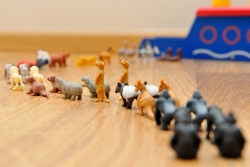Torah as Our Guide and Companion
The Heart of Torah: How Our Actions Bring it to Life
What makes the Torah different from any other book we read?
I posed this question years ago to a group of second graders as we began a lesson about Simchat Torah.
What Does it Mean to Be Human?
Wholly Jewish: Denis: Coming Out and Showing Up
Hosted by Jewish performance and ritual artist Shira Kline (she/her), a.k.a. ShirLaLa, this season features interviews with LGBTQ+ Jews from the Union for Reform Judaism's JewV'Nation Fellowship.
The Divine is No Ordinary Parent: Lessons from One God to One People
No other Torah portion is as well known or fires the imagination as much as Parashat Noach – but the story includes a number of problematic elements.
Love Yourself When Your Neighbors Won’t
This week's Torah reading, Parashat Balak, helps us consider the effects of persecution on our psyches. In it, we encounter Balaam, a prophet for hire, whom the Moabite king Balak enlists to curse the Israelites. Balaam, however, is unable to fulfill his commission. Balaam recounts:
From Aram has Balak brought me,
Moab's king from the hills of the East:
Come, curse me Jacob, Come, tell Israel's doom!
How can I damn whom God has not damned,
How doom when the Eternal has not doomed?
As I see them from the mountain tops,
Gaze on them from the heights,
There is a people that dwells apart,
Not reckoned among the nations, . . . (Numbers 23:7-9)
Balaam, looking down at the Children of Israel's camp from the heights of the surrounding peaks, sums up the people's history up to that point and well into the future: "There is a people that dwells apart, / Not reckoned among the nations," he sings.
Commissioning a New Leader on Inauguration Day
At this point in the Book of Numbers, we find Moses' term of service moving toward a conclusion and God begins planning for his succession. God tells Moses, "Single out Joshua son of Nun, an inspired individual, and lay your hand upon him. Have him stand before Eleazar the priest and before the whole community, and commission him in their sight. Invest him with some of your authority, so that the whole Israelite community may obey" (Numbers 27:18-20).
Hearing these instructions could not have been anything but painful for Moses. The leader of the Israelites for so long, how could he imagine anyone else in his place? And yet, they were perhaps comforting too. There would be no power vacuum. God would not let the progress of the last forty years fade away. The political transition would be a smooth one, free of upheaval and discord.
The Promised Land: Not So Far Off
A synagogue is, at its best, a place where each of us can feel that sense of rootedness and connectedness, a place where despite differences of age and experience; regardless of cultural background or class or sexual orientation or physical ability; whether we are "regulars" or newcomers, all of us can feel known and appreciated.
As we complete the Book of Numbers this week, we find the Israelites yearning for just such a place. Over the last eight weeks, our Torah readings have recorded the events of their 40 turbulent years in the wilderness. As we come to the last two portions of the book, Matot and Mas'ei, the Israelites are looking to come home.
Victim and Perpetrator - Reflecting on Our Role
This week's Torah portion, D'varim, occurs this year as it often does, on Erev Tishah B'Av — the ninth day of the month of Av. While not observed in many Reform communities, it is a day on which Jews throughout the world commemorate collectively all the tragedies experienced by our people. It was on this day, according to tradition, that both of our ancient, sacred Temples in Jerusalem were destroyed, the first by the Babylonian Empire in 586 BCE, the second by the Roman Empire in 70 CE. Many more horrific acts committed against Jews have been associated with this date as well.





